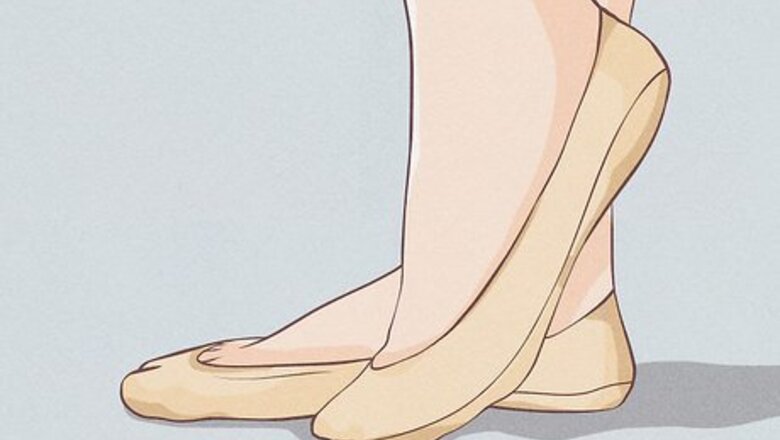
views
- Wear well-fitting clothes with clean lines. Choose outfits that compliment your shape and avoid loud colors with flashy patterns.
- Invest in a nice pair of shoes made from a high-quality fabric. Opt for a pair of comfortable leather boots, flats, or dress shoes instead of blinged out sneakers.
- Avoid carrying a fanny pack or large backpack with you, since it makes you look like a tourist and tells pickpockets that you’re carrying money around.
- Get a pair of nice, dark sunglasses to elevate your aesthetic and block out Italy’s bright, piercing sun.
Avoiding the Tourist Look
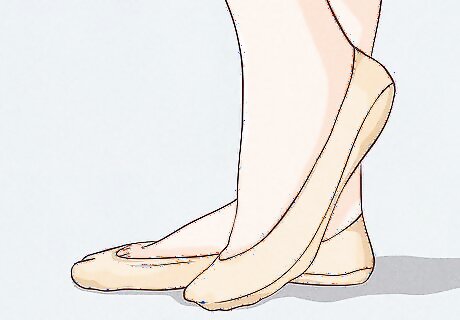
Wear invisible socks or nice socks that match the color of your shoe. Italians rarely wear white socks beneath their trousers. If you plan on visiting Italy, pack a few sets of “fantasmi” (or invisible/no-show socks). For more formal events, pack a dressier sock that matches the shade of your dress shoes. For example, wear brown socks with brown boots, blue socks with blue suede shoes, and so on. When searching for a quality dress sock, pay attention to how thinly the fabric of the sock is knit. The thicker, the better. Most high-quality Italian socks have a gambietto, which is a small additional fabric that makes the elastic more stretchy and durable. Avoid wearing socks with sandals altogether.
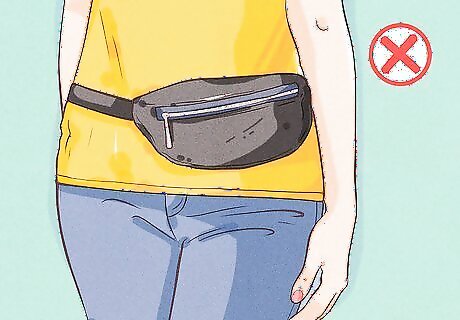
Leave large backpacks and fanny packs at home. Wearing a money belt or other travel gear in public not only makes you look out-of-place, it advertises that you’re carrying money around. This can be a safety hazard in larger cities, where pickpocketing is common. Carefully store money and other important documents in an inside or front pocket. If it doesn’t fit, leave it in a safe place wherever you’re staying. Also avoid wearing tennis shoes and t-shirts with slogans to hide that you’re a tourist and reduce your risk of getting harassed or pickpocketed.

Wear fashion-forward items in Milan and more traditional clothes in the South. Italian fashion sense varies depending on what region of the country you’re visiting. If you plan on traveling north near Milan, wear more designer name brands to keep up with the city’s sophisticated, high-fashion culture. If you’re going to Rome or further south, opt for a more understated wardrobe that adheres to more local traditions like monochromatic colors and understated craftsmanship. Dress more formally if you’re visiting a big city instead of a rural country town. Also consider the temperature of which area you’re visiting. In the summer, it can reach temperatures of 35 °C (95 °F) in Rome. In the winter, it gets chilly (as low as −4 °C (25 °F)) in North Italy.
Dressing Italian Style

Wear well-fitting clothes with clean lines. Italians love a classy look that compliments a person’s figure. Pack elegant outfits when that aren’t too baggy or too snug. When shopping for form-fitting attire, look for clothes that fit firmly around softer body parts while offering exposure to your more toned areas. Also, examine your silhouette to determine what body parts project outward (shoulders, waist, hips) and dress to compliment your body type. If you have wider shoulders, try on some flared pants and a v-neck blouse. Wear dresses that fit tightly against your waist if you have a more hourglass-like figure. If your hips are wider than your bust, look for structured shirts to accentuate your chest more. Sport tight, skinny pants and accented tops to highlight your arms and legs if you have a rectangular build. If you decide to wear a suit, add a more colorful, vibrant tie. This allows you to blend in with the monochromatic style of most locals, while still incorporating some high-fashion flair that Italy is known for. When in doubt, wear a pair of jeans or capri pants, paired with a more dressy, business-casual top.
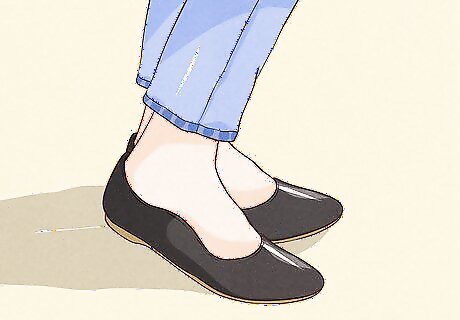
Wear nice shoes made of high-quality fabric. Italians study shoes, and they prefer classy, understated footwear without too much fake bling. Leave the flip flops, gaudy sandals, and hypebeast sneakers at home. Invest in a nice pair of Oxford dress shoes or pumps that you can dress up or down. Get your shoes shined if they look ragged or worn-down. If you plan on walking long distances for sight-seeing, find a shoe that’s equally classy and comfortable like a ponto, a deer stag, or a leather boot. If you're a female, think of simple ballet-style shoes or a nice runner (such as PUMA). Wear high heels when dining out at night if you’re female. Wedge shoes will be easier to walk in than stilettos. If you’re not in a major city, be wary of cobblestone streets that could damage your footwear or cause injury if you’re wearing heels.

Change your outfit for the evening. Italians dress differently for different times of day, so pack clothes for both day and night and switch outfits when the sun sets. Day fits are usually more casual (casual shirts and blouses, sightseeing sneakers) while night fits are more formal (blazers, dresses). Bring a pair of long pants with lighter fabric for hotter months and a trench coat or long sweater for months when the air is cold and crisper. Avoid wearing shirts with collar buttons or breast pockets at night. You can also never go wrong with a dress or skirt. If you’re a man, wear a long-sleeve shirt at night or when attending nicer venues. Jeans are okay, but dress them up with a nice blazer and dress shirt.

Wear classic colors like navy, black, and white. While certain Italian styles utilize loud, bold colors, most Italian fashion prioritizes a more understated, timeless elegance. Wear clothes with a more classic color palette like dark blue, black, cream, white and tan. Then, accent them with different shades to suit each season. In the summer, try incorporating some pastels into your wardrobe, such as lavender or a salmon. Try brighter and more floral colors in the spring: daffodil, dahlia, etc. Avoid showy or unnatural colors like mustard yellow, neon green, and lipstick pink.

Dress modestly for the Vatican and other cathedrals. If you plan on visiting one of Italy’s major churches or the Vatican City (the headquarters for the Roman Catholic Church), wear an outfit that follows their dress code. Keep your shoulders covered at all times and wear a shawl if your shirt or dress is sleeveless. Short shorts, hats, and mini skirts are prohibited altogether. Avoid any clothing with distracting or offensive imagery. When in doubt, dress like you would for a nice church service at home.
Accessorizing Like an Italian
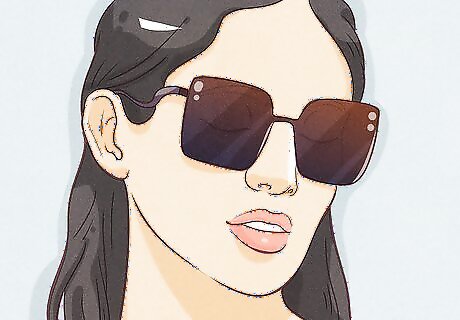
Wear a stylish pair of sunglasses. The sun in Italy is piercingly bright, so most Italians wear chic sunglasses for both safety and aesthetic. Find and sport a pair of sunglasses that matches your skin tone. If you have a cooler complexion, focus on cool tone lenses (blue, green, and pink). If your skin has a warmer pigmentation, focus on fiery-colored frames (reds, browns, and blacks). Also pack sunscreen to protect your skin during the summer months. Consider adding a straw hat with a brim to your outfit for a full sunny ensemble.

Bring a nicely-tailored jacket or sweater. Especially in the spring and fall, Italy’s climate can seesaw, ranging from 28 °C (82 °F) during the day to 10 °C (50 °F) at night. Have a coat on hand when the weather gets chilly after sunset or when dining in a nice restaurant. If you’re visiting Northern Italy during the winter, pack a warm padded coat, gloves, a scarf, and a hat. Avoid wearing a down jacket or vest, since they may mark you as a tourist. Bring a pair of leather boots as they’re warm enough for cold climates, elegant enough to dress up, and comfortable enough to walk in.
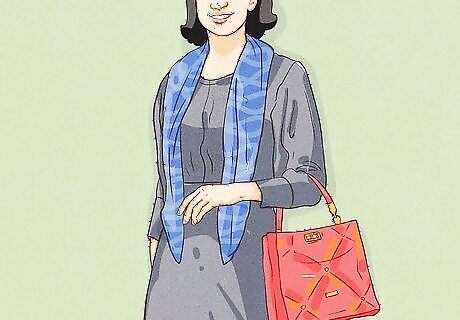
Elevate your look with a scarf and quality handbag. Incorporate a silk scarf into your wardrobe and carry around a handcrafted purse or satchel to add elegance to your aesthetic. In Italy, these items are unisex staples that can be worn by any gender and both can easily downplay the tourist look. Italians often wear jewelry and Italian women usually wear natural-looking makeup. Consider adding both of these to your outfit, but don’t wear anything too obvious if safety is a concern. Remember that Italians value clothing with elegant fabrics and clean lines, so avoid the messy patterns on your scarf or handbag.















Comments
0 comment